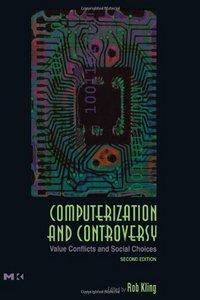 Zusammenfassungen
Zusammenfassungen
 How computers will change the world, both technologically and socially, has been the subject of many debates. This collection of essays doesn't try to predict the changes; instead, it clarifies the areas of controversy and brings up a range of possible futures rather than one predicted future. Rob Kling and his contributors ask their thought-provoking questions in eight sections.
How computers will change the world, both technologically and socially, has been the subject of many debates. This collection of essays doesn't try to predict the changes; instead, it clarifies the areas of controversy and brings up a range of possible futures rather than one predicted future. Rob Kling and his contributors ask their thought-provoking questions in eight sections.The first provides an overview of the controversies and offers a variety of analogies for the computerization of society. The second section covers the hopes of technological utopianism, while the third examines the economic, cultural, and organizational impact of computers. Kling devotes the fourth section to how computers transformed and will continue to transform the workplace. Part 5 covers social relationships in electronic forums and part 6 addresses privacy and social control issues. The seventh section looks at computer system safety and how both systems and their users may be vulnerable to attack. The concluding section concerns itself with the ethical and professional responsibilities of those involved with the future of computing.
Many of the essays take opposing sides of various questions. For example, in "The Electronic Hive: Embrace It," Kevin Kelly persuades readers that an interconnected networked society leads to richer human relationships. Sven Birkerts follows up with "The Electronic Hive: Refuse It," offering a counterdemonstration of how the same networking could lead to a society of shallower relationships. Similar debates appear over such topics as whether a computerized workplace will ultimately empower or further enslave workers and whether Internet developments will lead to greater personal freedom or a whittling away of our privacy. While there are no easy answers, Kling's collection of essays is a fascinating look at the issues surrounding the computerization debates.
 Dieses Buch erwähnt ...
Dieses Buch erwähnt ...
 Begriffe KB IB clear |  Problemlösefähigkeit Problemlösefähigkeit problem solving skills
, Roe v. Wade problem solving skills
, Roe v. Wade
| ||||||||||||||||||
 Bücher |
|
 Zitationsgraph
Zitationsgraph
 Zitationsgraph (Beta-Test mit vis.js)
Zitationsgraph (Beta-Test mit vis.js)
 2 Erwähnungen
2 Erwähnungen 
- The Charisma Machine - The Life, Death, and Legacy of One Laptop per Child (Morgan Ames) (2019)

- Education andTechnology - Key Issues and Debates (3rd edition) (Neil Selwyn) (2022)

 Co-zitierte Bücher
Co-zitierte Bücher
 Volltext dieses Dokuments
Volltext dieses Dokuments
 Bibliographisches
Bibliographisches 
 Beat und dieses Buch
Beat und dieses Buch
Beat hat dieses Buch während seiner Zeit am Institut für Medien und Schule (IMS) ins Biblionetz aufgenommen. Beat besitzt kein physisches, aber ein digitales Exemplar. (das er aber aus Urheberrechtsgründen nicht einfach weitergeben darf). Aufgrund der wenigen Einträge im Biblionetz scheint er es nicht wirklich gelesen zu haben. Es gibt bisher auch nur wenige Objekte im Biblionetz, die dieses Werk zitieren.












 , 14610 kByte)
, 14610 kByte) 



 Biblionetz-History
Biblionetz-History